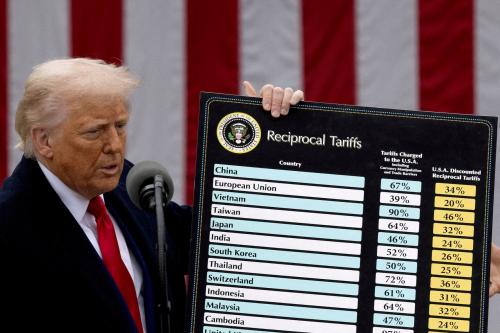As Vladimir Putin rips up the post-Cold War rules and menaces the portion of Ukraine he has not yet devoured, the American people are signaling their desire to withdraw from the world. According to today’s Wall Street Journal/NBC News poll, far more Americans than in recent decades want to United States to be less active in global affairs, a desire that crosses party lines.
After more than a decade of unsuccessful wars and an economy that has yet to recover fully from the Great Recession, this sentiment is understandable. It is also very dangerous. The entire world order rests on a United States that is willing and able to ensure the freedom of the seas and deter would-be regional hegemons. The American people are well aware of the burdens of leadership. It has been a long time since anyone has reminded them of the benefits.
This silence has direct consequences for America’s security and foreign policy. After a presidential trip designed to reassure our allies in the Pacific that the “pivot to Asia” is more than a rhetorical gesture, today’s Hill reports that for four months next year, the Navy will not have a single aircraft carrier in the region. This is part of a larger struggle over the Navy’s plans to reduce the permanent carrier fleet to 10, a step that officials say is needed to comply with mandatory budget cuts.
This contention is at least plausible. Over the next decade, the United States is on course to reduce its defense expenditures to just 2.6 percent of GDP, the lowest share since the end of World War II. I have yet to find a defense expert who believes that we can do this without a fundamental shift in America’s global posture.
At the very least, we should be debating this issue, and the president should be taking the lead. Instead, we are pretending that we can cut the military budget without paying a price. (We are engaging in the same pretense with the domestic budget, which is scheduled to undergo comparable cuts.
Seven decades ago, Walter Lippman defined solvency in foreign policy as “bringing into balance, with a comfortable surplus of power in reserve, the nation’s commitments and the nation’s power.” By that standard, the United States is careening toward bankruptcy. And when we get there, the American people will wonder why no one warned them.
The answer is sadly simple: hardly anyone in authority today is willing to tell the people what they don’t want to hear. There’s a name for the few who are willing—leader. We need some.
The Brookings Institution is committed to quality, independence, and impact.
We are supported by a diverse array of funders. In line with our values and policies, each Brookings publication represents the sole views of its author(s).




Commentary
The Real World Consequences of Cutting Military Spending
April 30, 2014